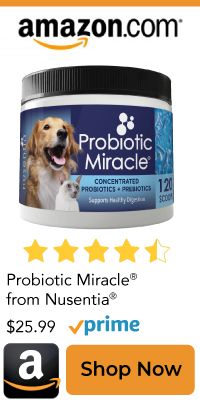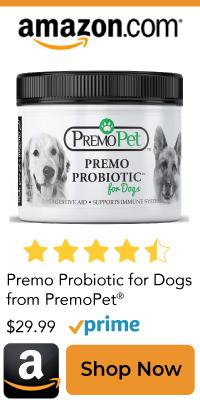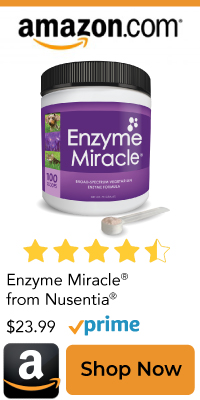Do Probiotics Have Side Effects for Dogs?
Probiotics are not known to have side effects as they are not considered a drug. Probiotics are referred to as "friendly bacteria" for a reason. Side effects or negative reactions are extremely rare in dogs, however, like any supplement, they should not be taken or given to your dog without caution.

What are the Risks?
Since we're dealing with live organisms that communicate and operate inside the body, it is smart to know the basics about the individual species of probiotics, their activity, and how they affect the body of your dog. [4]
The most common side effect would be during the transitional phase when your dog is first introduced to probiotics. Your dog may experience excess gas or bloating. In some cases, your dog may appear more thirsty. These are all signs that your dog is detoxifying, and generally subside within a matter of days, or at worst, a couple weeks.*
With any diet change, you can expect your dog to experience some physical changes, but in the end, probiotics are a generally safe way to promote wellness long term in your dog.
Are there any risks with probiotics?
Each species of dog probiotics has unique characteristics and perform some specific function in the gut. Of the innumerable amounts of species of probiotics for dogs, some, such as E. faecium, are more controversial than others their ability to become pathogenic [1, 2, 3], not just to your dog, but to the human delivering the probiotics on the food.
Learning about each species of dog probiotics, including innocuous (safe) and potentially hazardous ones, can be helpful in understanding what's right for your particular dog.
Top Sellers in Dog Probiotics

7 Signs Your Dog Needs Probiotics
If your dog is showing some of these symptoms, chances are he needs probiotics and digestive support.

Are Probiotics Safe for Puppies?
Probiotics are highly recommended for puppies and young dogs, here's why...
Cites and References
de Perio MA, Yarnold PR, Warren J, et al. Risk factors and outcomes associated with non-Enterococcus faecalis, non-Enterococcus faecium enterococcal bacteremia. Infect Control Hosp Epidemiol. 2006 Jan. 27(1):28-33.
Centers for Disease Control and Prevention (CDC). Vancomycin-resistant Staphylococcus aureus--New York, 2004. MMWR Morb Mortal Wkly Rep. 2004 Apr 23. 53(15):322-3.
Chang S, Sievert DM, Hageman JC, Boulton ML, Tenover FC, Downes FP, et al. Infection with vancomycin-resistant Staphylococcus aureus containing the vanA resistance gene. N Engl J Med. 2003 Apr 3. 348(14):1342-7./p>
- O'Sullivan GC, Kelly P, O'Halloran S, Collins C, Collins JK, Dunne C, et al. Probiotics: an emerging therapy. Curr Pharm Des 2005;11:3-10.
- 2. O'Sullivan GC. Probiotics. Br J Surg 2001;88:161-2.
 Probiotics for dogs: Probiotic Miracle
Probiotics for dogs: Probiotic Miracle Probiotics for dogs: Premo Probiotic
Probiotics for dogs: Premo Probiotic Enzymes for Dogs: Enzyme Miracle
Enzymes for Dogs: Enzyme Miracle